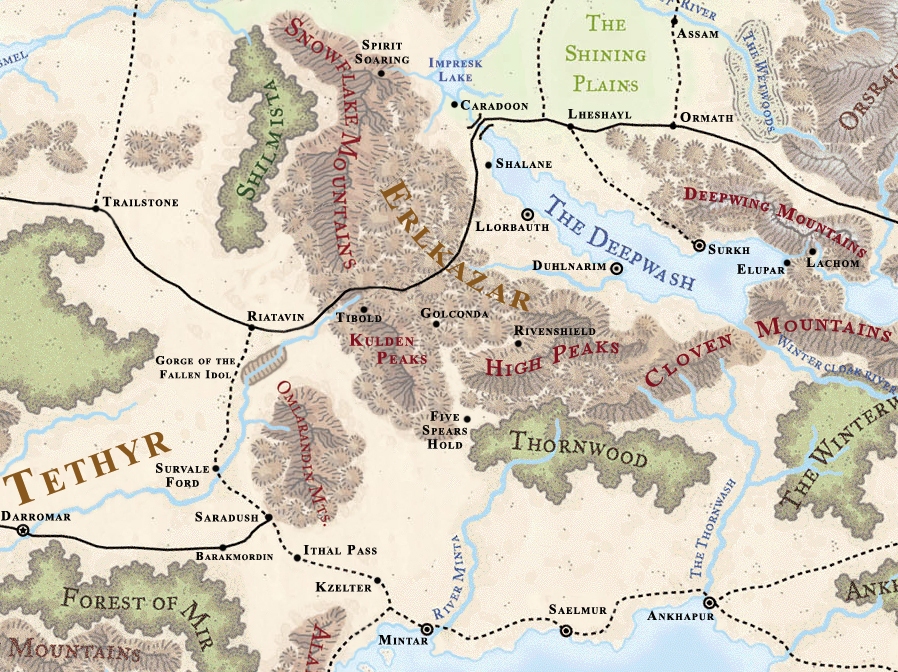Erlkazar: Difference between revisions
No edit summary |
No edit summary |
||
| Line 1: | Line 1: | ||
[[Faerun]] | [[Faerun]] | ||
[[File:Mt-erlkazar.jpg]] | |||
{|border="2" cellspacing="0" cellpadding="2" | {|border="2" cellspacing="0" cellpadding="2" | ||
Revision as of 21:42, 28 January 2015
| Capital | Ruler | Government | Races |
|---|---|---|---|
| Erlkazar | Varied | Clan | Human, Dwarf,Elf |
Erlkazar is a country that has a system of clan modeled after Scotland.
History
The land now known as Erlkazar was, until the last millennium, untamed wilderness. Karazir Tiiraklar of Tethyr, the consort of queen Vajra Korrunhel, and his brother Ellessor mustered an army and marched on this land. In 309 DR, Ellessor became the first duke of Elestam. When Shoonach fell, the lands reverted into wilderness. King Strohm II, after defeating Tathtar's invading army, claimed Elestam as part of Tethyr in 731 DR.
Nothing much of note occurred in the duchy until the time of the persecutions of the elves which left duke Valon Morkann torn. He supported the elves but was loyal to the crown. In the end, his loyalty won out and he kept the disputed trade routes open. Loyalty would play an important role during the Interregnum as well. During the Ten Black Days of Eleint in 1347 DR the political situation forced Morkann to accept the treacherous nobles in the realm who were allied to the tyrannical Duke of Dusk, even after four separate attempts on his life sponsored by them were foiled only by Morkann's friends in Elestam's Crusaders. Though his people were loyal to Morkann, they despised the other nobles, a fact which Morkann hadn't grasped until they rose up in rebellion against them. All of these traitors fled the duchy rather than face arrest by the duke or murder at the hands of the peasants.
Over the next year, Morkann fortified the duchy's borders and built up his armed forces until his people petitioned him to declare himself king over the region. He accepted and officially seceded from Tethyr, choosing to rename the land Erlkazar and rule directly, rather than through barons and counts. Erlkazar survived the Interregnum unscathed, though they were plagued with vampires and dragons throughout. The realm survived through Elestam's Crusaders and the Emerald Brotherhood until the Brotherhood was abducted by spacefaring illithid in 1359 DR (though the people were not informed of this; to them, the brotherhood's disappearance is a mystery to this day). 1358 DR saw an attack from the goblin hordes of King Ertyk Uhl down from the High and Kuldin Peaks that lasted nearly the entire year. For over three months, the goblins laid siege to the city of Duhlnarim until Elestam's Crusaders forged an alliance with the Shieldbreaker Ogres. The war turned and the goblins were cut down to a third of their number (according to reports, the horde had regained its strength by 1367 DR but didn't attack Erlkazar like that again).
In 1366 DR, King Morkann died, appointing his son Korox, the leader of Elestam's Crusaders, to succeed him. Korox appointed the other four Crusaders as his barons, who ruled justly over Erlkazar for the rest of their reigns. Out of the way and well fortified, Erlkazar still maintained good trade arrangements with many other countries, though their trade routes became infested with bandits over the years.
Saestra Karanok of Luthcheq, who was driven from her home when it was discovered that she was a vampire, traveled to Erlkazar and converted the massed bandits into her own personal army, who suddenly ceased their raids on the traders. She seduced the king at the time and turned him into a vampire after gaining the cooperation of the four barons with threats and manipulation. During the day, Erlkazar is a peaceful, sleepy land of farmers and hillfolk, much as it has been for decades, but at night, Saestra's bandit army emerges from the deep cavern she found beneath Ahlarkhem. They raid all of the countries that border Erlkazar, most often at midnight, provoking angry nobles to bring invading armies across the border, only for them to leave again when they find absolutely nothing but pastoral villages.
